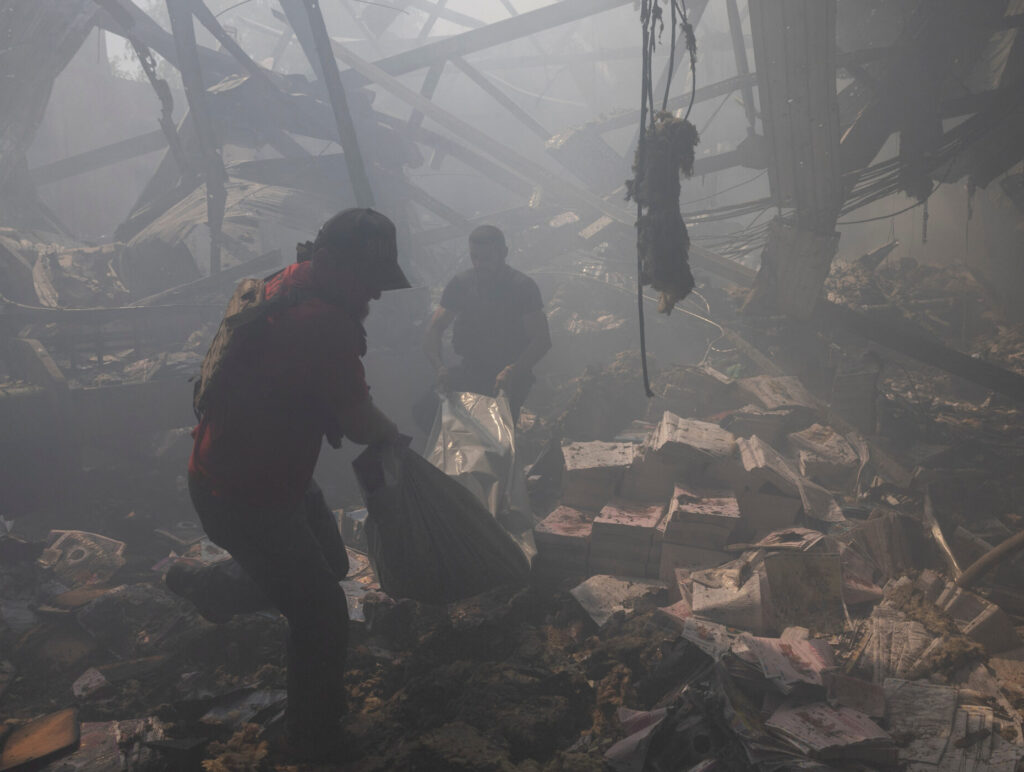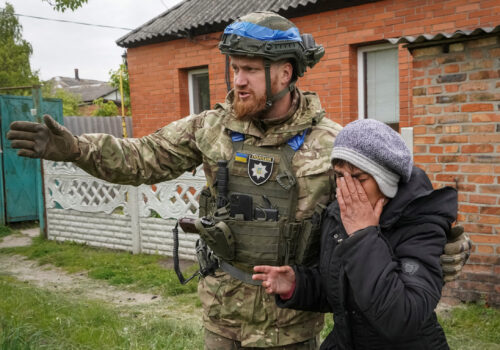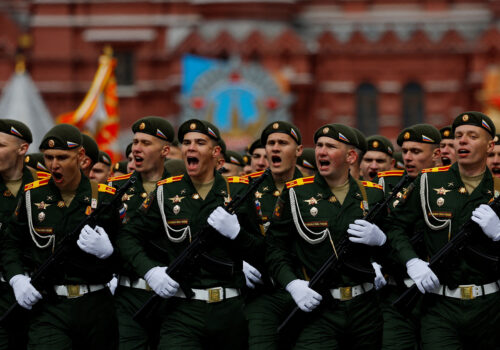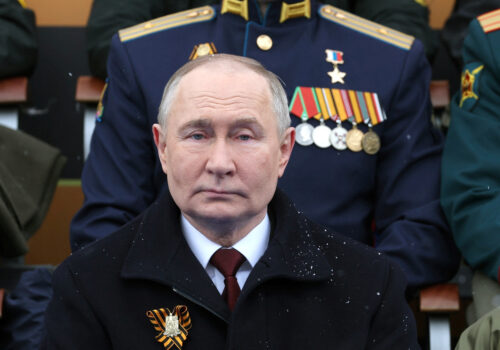On May 23, Russia launched a missile strike against Ukraine’s largest printing house, killing seven employees and leaving the facility in ruins. The attack on Kharkiv’s Factor Druk printing plant is the latest indication that Russia is deliberately targeting the Ukrainian book publishing industry.
Factor Druk owner Serhiy Polituchy said the loss of the plant could reduce Ukraine’s overall printing capacity by as much as forty percent. Around one-third of all new books published in Ukraine last year were printed at the Kharkiv facility. “We are now trying to figure out what we can do in the short term to prevent the book publishing industry from collapsing,” commented Polituchy.
Thursday’s bombing followed a number of similar air strikes on publishing houses and print facilities in Kharkiv, which serves as the unofficial capital of Ukraine’s publishing industry. The Kharkiv printing presses accounted for more than eighty percent of new Ukrainian books on the eve of Russia’s full-scale invasion just over two years ago. The city remains the primary source of new books in wartime Ukraine.
As Russia has escalated its air war against Kharkiv since the beginning of 2024, the publishing industry has been repeatedly hit. In a single March attack, Russian missiles destroyed another of Kharkiv’s largest print facilities and a publishing house, killing five. Mykhailo Khrypak, who serves as commercial director at one of Ukraine’s biggest printing plants, says Russia is systematically attempting to destroy the country’s book publishing industry, and warns that production capacity will be difficult to restore.
Stay updated
As the world watches the Russian invasion of Ukraine unfold, UkraineAlert delivers the best Atlantic Council expert insight and analysis on Ukraine twice a week directly to your inbox.
With Kharkiv desperately short of air defenses and located dangerously close to advancing Russian troops, the city’s remaining publishers are taking steps to ensure the safety of staff. Oleksandr Popovych, director of the Unisoft printing plant, has established a bomb shelter for his more than three hundred employees. Despite the recent escalation in attacks, he says he currently has no plans to relocate, pointing to the extreme difficulty of moving bulky printing equipment and relocating his highly skilled staff along with their families.
Ukraine’s domestic publishing industry has flourished over the past decade following the onset of Russian military aggression against the country in 2014. With the Kremlin openly weaponizing the Russian language to justify the invasion of Ukraine, demand for Ukrainian-language literature has risen to unprecedented levels. A new generation of Ukrainian authors has emerged, becoming part of a broader cultural renaissance that has also had a profound impact on the country’s music, fashion, and art scenes.
This trend has not proved popular in Russia, to say the least. Russian dictator Vladimir Putin has made no secret of the fact that he bitterly opposes the consolidation of an independent Ukrainian national identity, which he views as a direct threat to Russia’s own imperial identity.
Putin is notorious for insisting Ukrainians are in fact Russians (“one people”). He published an entire essay in July 2021 denying Ukraine’s right to an independent existence. On the eve of the full-scale invasion, Putin called Ukraine “an inalienable part of our own history, culture, and spiritual space.” More recently, he declared that “no Ukraine ever existed in the history of the world.” According to Putin, occupied regions of Ukraine are “historically Russian lands.”
Eurasia Center events

Many believe Russia’s recent attacks on the Ukrainian book publishing industry are part of a coordinated Kremlin campaign to erase Ukrainian national identity that qualifies as genocide. Responding to the latest bombing, Yale historian Timothy Snyder said the targeted missile strikes were “an example of a larger genocidal policy.”
The evidence of Russia’s intention to extinguish Ukrainian national identity is overwhelming. In virtually every area of Ukraine occupied by Russia since February 2022, strikingly similar reports have emerged of efforts to eradicate all traces of Ukrainian nationality. The Ukrainian language has been outlawed in schools and public spaces, with all symbols of Ukrainian statehood dismantled and removed.
Meanwhile, Russian occupation forces work with local collaborators to detain community leaders and anyone deemed pro-Ukrainian, including elected officials, journalists, civil society activists, military veterans, and cultural figures. Thousands of people detained in this manner are unaccounted for. Those who remain are pressured into accepting Russian citizenship and threatened with the loss of access to essential services such as healthcare.
Throughout occupied Ukraine, the Kremlin is going to great lengths to indoctrinate Ukrainian children and rob them of their Ukrainian heritage. Large numbers of Russian teachers have been brought to occupied regions to manage the indoctrination process in Ukrainian schools, while tens of thousands of Ukrainian children have been deported to Russia and sent to reeducation camps. This is a textbook act of genocide, according to the UN’s own 1948 Genocide Convention.
The actions of Putin’s army in Ukraine are very much in line with Russian imperial tradition. For centuries, generation after generation of Russian rulers sought to suppress Ukraine’s statehood aspirations and prevent the emergence of a separate Ukrainian nation. This insistence that Ukrainians be made to accept an imperial Russian identity was perhaps best expressed in a notorious mid-nineteenth century tsarist decree stating that the Ukrainian language “never existed, does not exist, and shall not exist.”
Kharkiv’s Slovo Building is a particularly striking symbol of these efforts to eradicate Ukrainian culture. Designed and constructed in the 1920s to host prominent Ukrainian writers, it was home to many of the country’s leading authors and poets who were later killed by the Soviet authorities. Today, they are known as the “Executed Renaissance.”
The efforts of successive Russian tsars and Soviet commissars failed to extinguish the Ukrainian desire for a country and an identity of their own. Putin’s own war on Ukrainian national identity is now proving similarly counter-productive. From poetry to pop music, contemporary Ukrainian culture is experiencing a golden age amid the horror and trauma of Russia’s full-scale invasion. Indeed, as news of Russia’s recent air strikes spread, it was no surprise to see various fundraising initiatives quickly emerge in support of the country’s beleaguered publishing industry. Putin may be able to burn Ukrainian books and bomb Ukraine’s printing presses, but his imperial crusade to erase Ukrainian identity is destined to fail.
Maria Avdeeva is a Kharkiv-based Ukrainian security analyst and strategic communication expert.
Further reading
The views expressed in UkraineAlert are solely those of the authors and do not necessarily reflect the views of the Atlantic Council, its staff, or its supporters.

The Eurasia Center’s mission is to enhance transatlantic cooperation in promoting stability, democratic values and prosperity in Eurasia, from Eastern Europe and Turkey in the West to the Caucasus, Russia and Central Asia in the East.
Follow us on social media
and support our work
Image: Volunteers carry the body of a person killed by Russian missile strikes at a compound of a printworks, amid Russia's attack on Ukraine, in Kharkiv, Ukraine May 23, 2024. REUTERS/Valentyn Ogirenko




